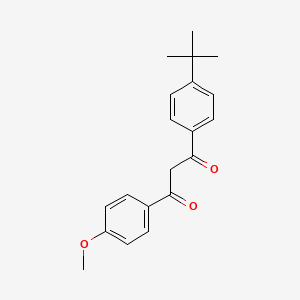防曬成份,化學性紫外線吸收劑,危險指數為 2/5(越高越不好)[1]。
Avobenzone的光穩定性(photostability)不高,經過紫外線的照射後會漸漸被分解而失去防曬效果,跟某些防曬成分(如ethylhexyl methoxycinnamate及無塗層物理防曬劑)放在一起,會更不穩定而更容易被光分解[2]。
[2]邱品齊醫師,「認識Butyl Methoxydibenzoylmethane (Avobenzone) 」,SkinDoc Chiu\'s 化妝品嚴選菁華版,2008/05/18。

請問乳液裡添加這種成分是好是壞??
衛生署規定濃度限量3%,此成分屬含藥化粧品需申請
個人使用含有這個成分的防曬都覺得很薰眼
擦在眼周時非常的不舒服
如果眼睛敏感的人 挑選防曬產品時
可以先試用看看再選購
網路上也有不少眼睛敏感的人表示這成分會薰眼
可以多注意
對陽光波長320nm~400nm的紫外線吸收力好,搭配物理性防曬達到更好的功效,是公認有效的化學性UVA吸收劑
最大吸收值是357nm,光穩定性不佳,1小時光解率36%,需要和其他穩定性好的防曬劑同用,如奧克立林,天萊施等
"Avobenzone is an FDA-approved chemical to block UVA, the primary culprit of premature aging and skin cancer. But avobenzone breaks down very quickly in sunlight and releases harmful free radicals. So many brands add avobenzone stabilizers like octocrylene, homosalate, or octisalate. However, these chemicals may also trigger an allergic response and/or disrupt your hormone level."
https://ecocult.com/eco-friendly-effective-sunscreen/
https://pubchem.ncbi.nlm.nih.gov/compound/Avobenzone
The famous Avobenzone. It is a special snowflake as it is the only globally available chemical sunscreen agent that provides proper UVA protection (in the US, new generation sunscreen agents are not approved because of impossible FDA regulations). It is the global gold standard of UVA protection and is the most used UVA sunscreen in the world.
It gives very good protection across the whole UVA range (310-400 nm that is both UVA1 and UVA2) with a peak protection at 360 nm. The problem with it, though, is that it is not photostable and degrades in the sunlight. Wikipedia says that avobenzone loses 36% of its UV-absorption capacity after just one hour of sunlight (yep, this is one of the reasons why sunscreens have to be reapplied after a few hours).
https://incidecoder.com/ingredients/butyl-methoxydibenzoylmethane
Fast facts
Approved in: United States, Australia, Europe
Banned in: None; restricted use in Japan
Best for: Sun damage prevention
Coral safe? Detectable levels but no harm found
Found in chemical sunscreens
Avobenzone is commonly used to block the full range of UVA rays and is reported as ‘unstable’ in physical sunscreens.
On its own, the ingredient destabilizes when exposed to light. To combat this, it’s often paired with other ingredients (such as mexoryl) to stabilize avobenzone.
In many countries, avobenzone is used in combination with zinc oxide and titanium dioxide specifically, but in the United States, the combination isn’t permitted.
While it’s found in broad-spectrum sunscreens, it’s often combined with other chemicals because avobenzone by itself will lose 50 to 90 percentTrusted Source of its filtering abilities within an hour of light exposure.
In the U.S., the FDA deems this ingredient safe but restricts the concentration amount to 3 percent in sunscreen formulations.
https://www.healthline.com/health/beauty-skin-care/best-sunscreen-ingredients#avobenzone
Avobenzone(又稱為Butyl Methoxydibenzoylmethane)-爭議性大,遇光會不穩定
Avobenzone + EthylHexyl Methoxycinnamate = 更不穩定更毒
目前學界分為兩派說法
第一派:
根據文獻研究,Avobenzone在碰到光的時候會容易產生分解,是不穩定的
而分解出來的物質,也會傷害我們的皮膚細胞
進到體內後,也會干擾我們的內分泌
另一派:
Avobenzone如果再搭配一些化學物質,就可以穩定它
例如「Octocrylene」、「Tinosorb」等等
就能使Avobenzone不會被光分解掉
能夠安全的保護我們不受紫外線威脅
但是如果Avobenzone碰到「Octinoxate (Ethylhexyl methoxycinnamate)」,它會讓Avobenzone變得更不穩定而且更毒,但Octinoxate (Ethylhexyl methoxycinnamate)雖然本身也有問題但卻非常常見,除了防曬產品也常見於於香水、妝前乳、BB霜、CC霜、粉底、蜜粉中
消費者把產品層層疊疊塗在臉上,Avobenzone就很容易碰到Octinoxate (Ethylhexyl methoxycinnamate)
於是他們相遇了就變得更不穩定,就產生皮膚傷害
結論:含有Avobenzone的產品安不安全有可能是安全的,但Dr. Ivan 6本人不喜歡這個成分
PS.
Octinoxate
= Ethylhexyl methoxycinnamate
非常常見,約80%防曬產品都有
也常見於香水、妝前乳、BB霜、CC霜、粉底、蜜粉中
會刺激肌膚,在照射到太陽後產生發癢
更不適合有皮膚炎的人
另外它對珊瑚一樣有害
參考資料:Dr. Ivan 6
https://www.youtube.com/watch?v=ebV6Ce3bTJw&list=PLjqh8dmRe2ys1JxtTGAsO1_1-9JaSXT1-&index=4
Avobenzone is a widely used organic filter that provides protection from UVA rays and is often used with other organic active ingredients in products offering broad spectrum protection.
Because avobenzone is not stabile, it must be paired with other ingredients that act as stabilizers to prevent it from breaking down in the sun. Breakdown products of avobenzone can cause allergic reactions (Nash 2014). Avobenzone can disrupt the endocrine system and has been shown to block the effects of testosterone in cellular studies (Klopcic 2017).
In one study, avobenzone was detected in serum samples at levels nine times above the FDA's cutoff for systemic exposure (Matta 2020).
https://www.ewg.org/sunscreen/report/the-trouble-with-sunscreen-chemicals/
- Nivea (妮維雅) Cellular Luminous 630 Anti-Dark Spot Day Cream Face Moisturiser SPF50
- Jergens Natural Glow Face Moisturizer Fair To Medium Tone, Self Tanner, Daily Face Sunscreen - SPF 20
- Uriage (優麗雅) Bariesun Invisible Spray SPF 50+
- Avene (雅漾) Silky Mist SPF 30
- Dr Josif Pancic Dnevni krem za zrelu kozu
